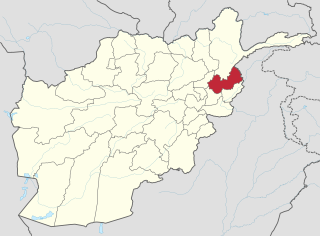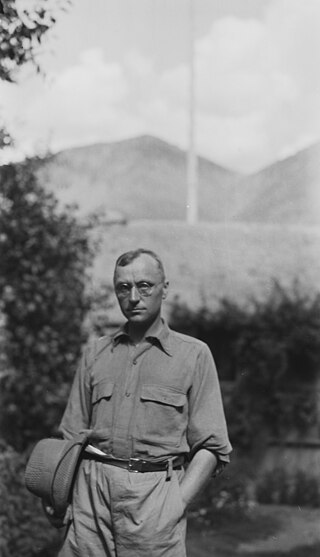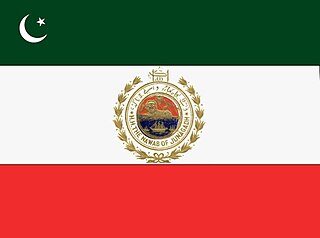Related Research Articles

Pashto is an Eastern Iranian language in the Indo-European language family. It is known in historical Persian literature as Afghani.

The Nuristani languages, also known as Kafiri languages, are one of the three groups within the Indo-Iranian language family, alongside the much larger Indo-Aryan and Iranian groups. They have approximately 130,000 speakers primarily in eastern Afghanistan and a few adjacent valleys in Khyber Pakhtunkhwa's Chitral District, Pakistan. The region inhabited by the Nuristanis is located in the southern Hindu Kush mountains, and is drained by the Alingar River in the west, the Pech River in the center, and the Landai Sin and Kunar rivers in the east. The languages were previously often grouped with Indo-Aryan or Iranian until they were finally classified as forming a third branch in Indo-Iranian.
Amir Abdullah Khan Rokhri was a politician and was actively involved in the Pakistan Movement.

Khowar or Chitrali, is an Indo-Aryan language primarily spoken in Chitral and surrounding areas in Pakistan.

Dameli (دَميلي), also Damia, Damiabaasha or Gidoj, is an Indo-Aryan language of the Dardic subgroup spoken by approximately 5,000 people in the Domel Town, in the Chitral District of Khyber-Pakhtunkhwa province of Pakistan.

Kalasha is an Indo-Aryan language spoken by the Kalash people, in the Chitral District of Khyber Pakhtunkhwa province of Pakistan. There are an estimated 4,100 speakers of Kalasha. It is an endangered language and there is an ongoing language shift to Khowar.

Palula and also known as Ashreti (Aćharêtâʹ) or Dangarikwar, is an Indo-Aryan language spoken by approximately 10,000 people in the valleys of Ashret and Biori, as well as in the village of Puri in the Shishi valley and at least by a portion of the population in the village Kalkatak, in the Chitral District of Khyber Pakhtunkhwa province of Pakistan.

Gawar-Bati or Narsati is an Indo-Aryan language spoken in the Chitral region of northern Pakistan, and across the border in Afghanistan. It is also known as Aranduyiwar in Chitral because it is spoken in Arandu, which is the last village in lower Chitral and is also across the border from Berkot in Afghanistan. There are about 9,000 speakers of Gawar-Bati, with 1,500 in Pakistan, and 7,500 in Afghanistan. The name Gawar-Bati means "speech of the Gawar", a people detailed by the Cacopardos in their study of the Hindu Kush.

The Yidgha language is an Eastern Iranian language of the Pamir group spoken in the upper Lotkoh Valley of Chitral in the Khyber Pakhtunkhwa province of Pakistan. Yidgha is similar to the Munji language spoken on the Afghan side of the border.

Mian Iftikharuddin was a Pakistani politician, activist of the Indian National Congress, who later joined the All-India Muslim League and worked for the cause of Pakistan under the leadership of Muhammad Ali Jinnah.

Norway competed at the 1988 Summer Olympics in Seoul. 69 competitors, 44 men and 25 women, took part in 42 events in 11 sports.

Tando Muhammad Khan is a city and headquarter of the Tando Muhammad Khan District located in Sindh, Pakistan. Is is named after Mir Muhammad Khan Talpur Shahwani.
Old Golimar Purana Golimar is a neighborhood in the Karachi West district of Karachi, Pakistan. It was previously administered as part of the SITE Town borough, which was disbanded in 2011.

Georg Valentin von Munthe af Morgenstierne was a Norwegian professor of linguistics with the University of Oslo (UiO). He specialized in Indo-Iranian languages.

Ormuri Persian: زبان ارموری; literally, "Ormuri language") also known as Baraki, Ormur, Ormui or Bargista is an Eastern Iranian language spoken in Southeast Afghanistan and Waziristan. It is primarily spoken by the Burki people in the town of Kaniguram in South Waziristan and Logar, Afghanistan. The language belongs to the Eastern-Iranian language group. The extremely small number of speakers makes Ormuri an endangered language that is considered to be in a "threatened" state.

Lars Rasch was a Norwegian jurist. He served as Mayor of Oslo and was a developer of the neighborhood of Homansbyen

The name Afghānistān means "land of the Afghans", which originates from the ethnonym Afghan. Historically, the name Afghan mainly designated Pashtuns, the largest ethnic group of Afghanistan. The earliest reference to the name is found in the 10th-century geography book known as Hudud al-'Alam. The last part of the name, -stān is a Persian suffix for "place".
The Mumo are a Nuristani tribe in Afghanistan living primarily in the Bashgal Valley, centered in the village of Bagalgrom. Their language is Mumviri, a dialect of the Kamkata-vari language.

Pashto dialects can be divided into two large varieties: Northern Pashto and Southern Pashto. Each of the two varieties of Pashto is further divided into a number of dialects. Northern Pashto is spoken in eastern Afghanistan, and central, northern and eastern Khyber Pakhtunkhwa. Southern Pashto is spoken to the south of it, in southern and western Afghanistan, southern Khyber Pakhtunkhwa and northern Balochistan. 'Ethnologue' divides Pashto into Northern, Southern and Central Pashto, and Wanetsi.

Junagarh or Junagadh was a princely state in Gujarat ruled by the Muslim Babi dynasty in British India, until its integration into the Union of India in 1948.
References
- ↑ My heartrendingly tragic story. By Muhammad Abdullah Khan Azar, Muhammad Abdullah Khan, Alberto M. Cacopardo, Ruth Laila Schmidt, Georg Morgenstierne, Knut Kristiansen Translated by Georg Morgenstierne, Knut Kristiansen. Novus, 2006. ISBN 82-7099-432-4, ISBN 978-82-7099-432-8. Pg 3.
